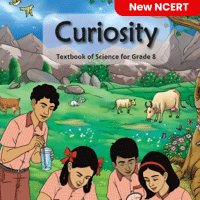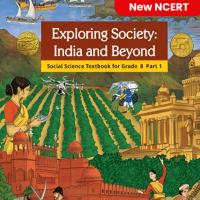Class 8 Exam > Class 8 Questions > Choose the best answer to fill the gap in eac...
Start Learning for Free
Choose the best answer to fill the gap in each of the following:
Q. We didn 't arr ange to meet. It was _______ coincidence that I saw him.
- a)clear
- b)clean
- c)great
- d)pure
Correct answer is option 'D'. Can you explain this answer?
Most Upvoted Answer
Choose the best answer to fill the gap in each of the following:Q.We d...
Understanding the Context
In the sentence, “We didn’t arrange to meet. It was _______ coincidence that I saw him,” the missing word should describe the nature of the coincidence. The options provided are “clear,” “clean,” “great,” and “pure.”
Analyzing the Options
- Clear: This term refers to something easily understood or transparent. It does not appropriately describe a coincidence.
- Clean: Generally associated with cleanliness or purity, but it doesn’t fit the context of describing a coincidence.
- Great: This implies something significant or large. While it could describe a coincidence, it isn’t the most fitting word in this context.
- Pure: This word denotes something untainted or unadulterated. In the context of coincidence, “pure coincidence” is a common phrase used to describe an event that occurs without any planning or influence, purely by chance.
Why "Pure" is Correct
The phrase “pure coincidence” emphasizes the randomness and absence of intention behind the meeting. It indicates that the occurrence was not orchestrated or expected.
Using “pure” effectively conveys the idea that the meeting was purely by chance, which aligns perfectly with the context of the sentence.
Conclusion
Thus, the best answer to fill the gap is “pure,” making the sentence read: “It was **pure** coincidence that I saw him.” This highlights the serendipity of the encounter, underscoring that it was unplanned and unexpected.
In the sentence, “We didn’t arrange to meet. It was _______ coincidence that I saw him,” the missing word should describe the nature of the coincidence. The options provided are “clear,” “clean,” “great,” and “pure.”
Analyzing the Options
- Clear: This term refers to something easily understood or transparent. It does not appropriately describe a coincidence.
- Clean: Generally associated with cleanliness or purity, but it doesn’t fit the context of describing a coincidence.
- Great: This implies something significant or large. While it could describe a coincidence, it isn’t the most fitting word in this context.
- Pure: This word denotes something untainted or unadulterated. In the context of coincidence, “pure coincidence” is a common phrase used to describe an event that occurs without any planning or influence, purely by chance.
Why "Pure" is Correct
The phrase “pure coincidence” emphasizes the randomness and absence of intention behind the meeting. It indicates that the occurrence was not orchestrated or expected.
Using “pure” effectively conveys the idea that the meeting was purely by chance, which aligns perfectly with the context of the sentence.
Conclusion
Thus, the best answer to fill the gap is “pure,” making the sentence read: “It was **pure** coincidence that I saw him.” This highlights the serendipity of the encounter, underscoring that it was unplanned and unexpected.
Free Test
FREE
| Start Free Test |
Community Answer
Choose the best answer to fill the gap in each of the following:Q.We d...
Adjectives collocated with ‘coincidence’: complete, pure, sheer, mere, happy, unfortunate, unhappy, amazing, curious, extraordinary, funny incredible, odd, remarkable, strange, wonderful.

|
Explore Courses for Class 8 exam
|

|
Question Description
Choose the best answer to fill the gap in each of the following:Q.We didn t arr ange to meet. It was _______ coincidence that I saw him.a)clearb)cleanc)greatd)pureCorrect answer is option 'D'. Can you explain this answer? for Class 8 2025 is part of Class 8 preparation. The Question and answers have been prepared according to the Class 8 exam syllabus. Information about Choose the best answer to fill the gap in each of the following:Q.We didn t arr ange to meet. It was _______ coincidence that I saw him.a)clearb)cleanc)greatd)pureCorrect answer is option 'D'. Can you explain this answer? covers all topics & solutions for Class 8 2025 Exam. Find important definitions, questions, meanings, examples, exercises and tests below for Choose the best answer to fill the gap in each of the following:Q.We didn t arr ange to meet. It was _______ coincidence that I saw him.a)clearb)cleanc)greatd)pureCorrect answer is option 'D'. Can you explain this answer?.
Choose the best answer to fill the gap in each of the following:Q.We didn t arr ange to meet. It was _______ coincidence that I saw him.a)clearb)cleanc)greatd)pureCorrect answer is option 'D'. Can you explain this answer? for Class 8 2025 is part of Class 8 preparation. The Question and answers have been prepared according to the Class 8 exam syllabus. Information about Choose the best answer to fill the gap in each of the following:Q.We didn t arr ange to meet. It was _______ coincidence that I saw him.a)clearb)cleanc)greatd)pureCorrect answer is option 'D'. Can you explain this answer? covers all topics & solutions for Class 8 2025 Exam. Find important definitions, questions, meanings, examples, exercises and tests below for Choose the best answer to fill the gap in each of the following:Q.We didn t arr ange to meet. It was _______ coincidence that I saw him.a)clearb)cleanc)greatd)pureCorrect answer is option 'D'. Can you explain this answer?.
Solutions for Choose the best answer to fill the gap in each of the following:Q.We didn t arr ange to meet. It was _______ coincidence that I saw him.a)clearb)cleanc)greatd)pureCorrect answer is option 'D'. Can you explain this answer? in English & in Hindi are available as part of our courses for Class 8.
Download more important topics, notes, lectures and mock test series for Class 8 Exam by signing up for free.
Here you can find the meaning of Choose the best answer to fill the gap in each of the following:Q.We didn t arr ange to meet. It was _______ coincidence that I saw him.a)clearb)cleanc)greatd)pureCorrect answer is option 'D'. Can you explain this answer? defined & explained in the simplest way possible. Besides giving the explanation of
Choose the best answer to fill the gap in each of the following:Q.We didn t arr ange to meet. It was _______ coincidence that I saw him.a)clearb)cleanc)greatd)pureCorrect answer is option 'D'. Can you explain this answer?, a detailed solution for Choose the best answer to fill the gap in each of the following:Q.We didn t arr ange to meet. It was _______ coincidence that I saw him.a)clearb)cleanc)greatd)pureCorrect answer is option 'D'. Can you explain this answer? has been provided alongside types of Choose the best answer to fill the gap in each of the following:Q.We didn t arr ange to meet. It was _______ coincidence that I saw him.a)clearb)cleanc)greatd)pureCorrect answer is option 'D'. Can you explain this answer? theory, EduRev gives you an
ample number of questions to practice Choose the best answer to fill the gap in each of the following:Q.We didn t arr ange to meet. It was _______ coincidence that I saw him.a)clearb)cleanc)greatd)pureCorrect answer is option 'D'. Can you explain this answer? tests, examples and also practice Class 8 tests.

|
Explore Courses for Class 8 exam
|

|
Signup for Free!
Signup to see your scores go up within 7 days! Learn & Practice with 1000+ FREE Notes, Videos & Tests.























